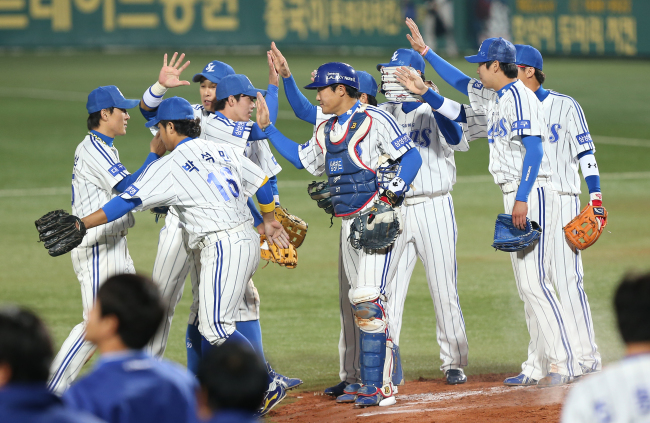Potential top draft pick Otani likely to lead rush to MLB as Japanese scouts face more restrictions
The Yomiuri Shimbun

"I admire both Japanese and American professional baseball, but I have stronger feelings toward the major leagues," Otani, ace pitcher for Hanamaki Higashi High School in Iwate Prefecture, said at a press conference Sunday.
Surrounded by about 60 reporters, Otani, 18, talked in a detached but smooth manner about his decision to seek a career in Major League Baseball. His facial expression suggested the steeliness of his determination.
The 1.93-meter, 86-kilogram right-hander turned plenty of heads when his fastball clocked 160 kph in the Iwate prefectural preliminary for the national championship this summer. His batting is also impressive with 56 homers to his credit during his high school career.
The first potential top draft pick to head across the Pacific was Junichi Tazawa, who was a corporate league player at Nippon Oil Corp., now JX-ENEOS. He joined the Boston Red Sox in 2008.
The following year, pitcher Yusei Kikuchi, three years Otani's senior at Hanamaki Higashi, said he wanted to become an MLB player. After interviews with scouts from 20 Nippon Professional Baseball and MLB teams, Kikuchi stayed in Japan and is now with the Saitama Seibu Lions.
MLB teams sent scouts to watch Otani pitch and have enthusiastically followed his progress since he entered high school.
Otani submitted a document to the Japan High School Baseball Federation last month expressing his intention to become a professional baseball player. At the time, he said he would like to play either in Japan or the United States.
He had interviews with the Los Angeles Dodgers, Texas Rangers and BoSox, in addition to NPB teams.
Several Japanese pro teams reportedly planned to choose him as their first pick in the NPB draft scheduled for Thursday.
===
Bigger financial rewards
A major reason for Japanese baseball talent opting for an MLB career is money.
In 2009, the Washington Nationals gave pitcher Stephen Strasburg a major league record four-year contract worth 15.1 million dollars (then about 1.4 billion yen). He was drafted by the Nationals as the first pick in the first round. A new labor deal agreed between MLB owners and the MLB Players Association last year set a cap on signing bonuses according to the order of draft picks in the United States. Teams with financial surpluses are expected to use more money in areas outside the draft's target, including Japan, to acquire players.
In contrast, NPB in 2007 set the cap on a rookie's contract at 100 million yen, with incentives up to 50 percent of the total contract. Some observers have argued that if a major league team offers a contract of more than 100 million yen to a player, Japanese teams should offer, in exceptional cases, contracts exceeding this. However, this idea has not been realized. Others argue that a surge in contract money due to a "money war" between Japan and the United States would lead to players picked in the draft to feel they had been treated unfairly.
There are big differences in how Japanese and American scouts are regulated in Japan. Japanese scouts must be registered with the NPB and contact with players and people close to them is tightly restricted. They are able to talk directly with high school students only after the National High School Baseball Championship, played at Koshien Stadium in August, and university students from Sept. 1.
MLB teams have been improving their overseas scouting networks and many have resident scouts in Japan.
The Texas Rangers watched former Nippon Ham Fighters pitcher Yu Darvish for several years before acquiring him, and many teams frequently send scouts to Japan to check out promising players.
Like NPB teams, they do not have easy access to student players due to Japan Student Baseball Association regulations. However, even if they violate the rules, there is no punishment.
After Tazawa shunned the Japanese draft and joined the Red Sox in 2008, many in professional and amateur circles argued that MLB scouts should be registered with the NPB to regulate their activities. However, the idea has not materialized.
===
Rules between Japan, U.S.
What about rules between Japan and the United States about player acquisition?
There is a "gentlemen's agreement" to exercise restraint on amateur players who are subject to each country's draft. However, such an agreement may violate the U.S. Antitrust Law in terms of "unreasonable restraint of trade." As a result, the agreement has not been formally documented.
There is a player contract agreement between Japan and the United States, but it only obliges pro baseball teams to file a request for the status and availability of players.
There are "sanctions" for Japanese players who skip the Japanese draft and join an MLB team. These players will not be allowed to join an NPB team for a certain period of time even if they return to Japan.
However, this is not a decisive way to stop the flow of Japanese players to the United States. "In reality, there are no measures to restrict activities of major league teams in Japan," a source close to the NPB said.
On the MLB side, there are moves to institutionalize a system to acquire rookies from overseas. In December last year, MLB launched the International Talent Committee to study the introduction of an international draft. Currently the MLB draft is limited to the United States, Canada and Puerto Rico, but it may be expanded to include East Asia and Latin America. "It is inevitable...When we went to the draft in 1965, it was to create a more level playing field. We've done that, and the same thing will have to happen internationally," MLB Commissioner Bud Selig said.
The panel's agenda includes measures to get to the bargaining table to revise protocol agreements with professional leagues in Japan, South Korea and Taiwan to implement the worldwide draft.
(Oct. 23, 2012)






